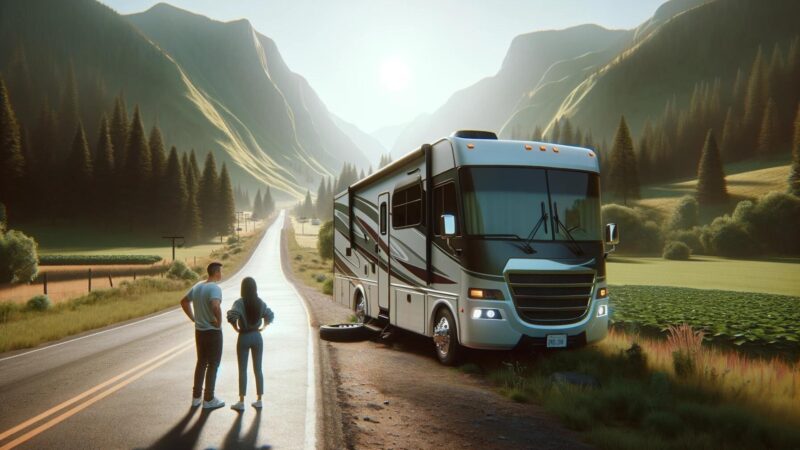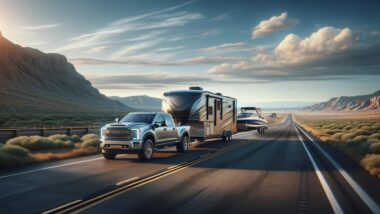Table of Contents Show
If you watch different RV content creators, you may think full-time RVing is the most amazing lifestyle.
But if you’re considering the full-time RV life, we want to warn you that a few mistakes could completely derail your adventures.
Today, we’re sharing seven wrong ways to start this lifestyle and suggesting what to do instead.
Let’s dive in!
What’s the Difference Between Full-Time RVers and Weekend Warriors?
Because we’re talking about full-time RV living today, let’s clarify the difference between full-timers and part-timers.
Full-time RVers live in their RV year round. They can travel the country or remain in one campground, this is called stationary living. Today we will focus on those who travel and not those who remain stationary.
On the other hand, part-timers — also called weekend warriors or weekenders — hit the campgrounds after a long work week, seeking relaxation and escape from the daily grind. They arrive on Friday evening and leave on Sunday morning.
They don’t live in their RVs. These weekend warriors may take a week-long road trip during the summer or visit the beach for spring break, but they aren’t traveling the country year-round in their RV.
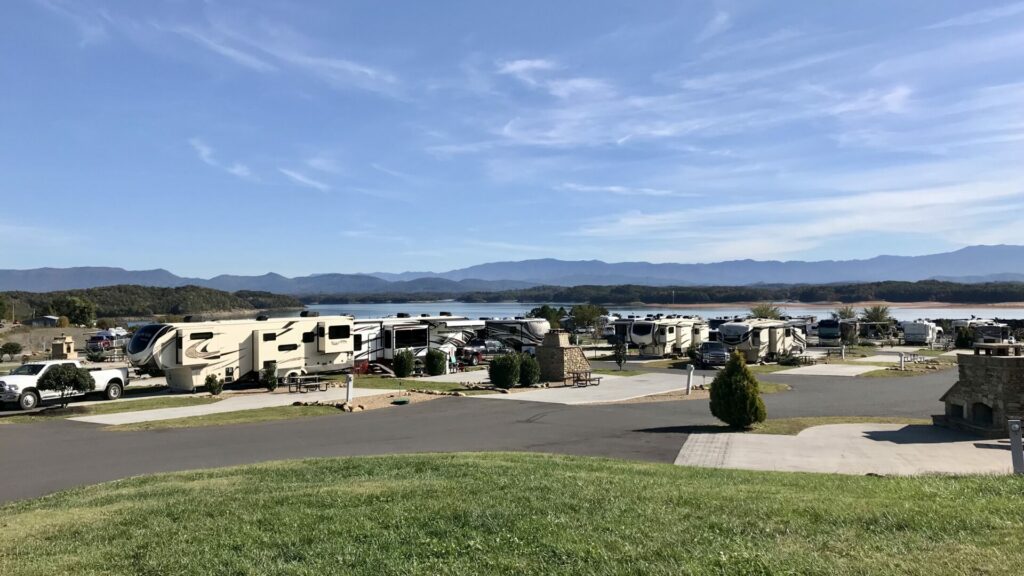
Learn More: If you want a fun read, check out the 7 Specific Things Full-Timer RVers Do Better Than Weekenders!
Why Would Someone Choose to Live Full-Time in an RV?
Instagram and TikTok make full-time RVing look like it’s all sunsets and wine glasses by the fire. But in actuality, the RV lifestyle can be stressful and challenging.
So, why would anyone choose to travel in 300 square feet and deal with the constant repairs and struggles that come with full-time RV living?
Most people choose this lifestyle because the benefits outweigh the cons. Yes, there are inconvenient and expensive repairs.
Yes, it can be challenging to find campgrounds that aren’t full on holiday weekends. It can also get lonely while on the road full-time.
But there’s also tremendous freedom. Full-timers can wake up practically wherever they want. If they’re tired of wind and rain, they can find sunshine and 70-degree weather.
If they want to visit friends in California one month and family in Oregon the next, they can. Their lives are full of new places, new people, and new discoveries.
While it has typically been retired folks, many younger people are embarking on the full-time RV lifestyle with the option to work remotely.
They’re choosing memories, adventures, and experiences over money, status, and stuff. Because of remote learning and working, families can hit the road together.
Gone are the long days of office work. Instead of missing soccer games or dance recitals, parents are spending quality time with their kids hiking, paddling, horseback riding, and fishing.
Are there cons to full-time RV living? Absolutely! Living in a tiny space is hard, especially with multiple people. Maintenance and repairs can take the fun out of an adventure.
Full-timers miss their friends and family back home. But those who choose this lifestyle do so because of the greater rewards.
Top 7 Mistakes to Avoid When You Start Full-Time RVing
If you’re considering the full-time RV life, you’re in for an incredible journey! But to help you avoid frustrations, we want to share seven common mistakes.
While none of these will completely derail your plans, it’s likely that if you make a few of them, you won’t be traveling long.
1. Choosing a Rig That Exceeds Your Budget
Before you ever hit the road, you must set a budget. This includes campground fees, attraction tickets, fuel, utilities, and other line items. You must also avoid starting your journey with a huge monthly payment you can’t afford.
If you choose an RV that exceeds your budget, you won’t have the money to enjoy the full-time RVing lifestyle.
If all your income goes to paying for the RV, what’s the point of traveling? You want to be able to do things in new places and experience new destinations. If you’re “RV-poor,” you’ll be captive to your rig.
Pro Tip: Be sure to check out The Worst RV Floor Plans before making your RV purchase!
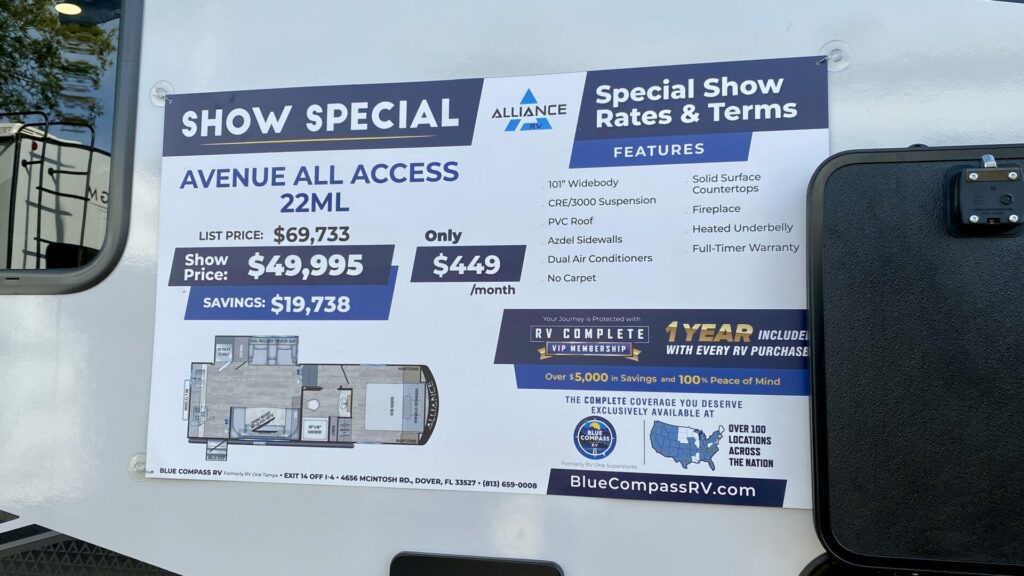
2. Attempting to Book Campsites on the Fly
With the increasing popularity of RVing, you don’t want to wait until the last minute to book campsites.
Campgrounds are crowded. Boondocking locations are crowded. People are enjoying the RV lifestyle, which is fantastic! But that also means booking last-minute campsites is challenging.
If you’re a fly-by-the-seat-of-your-pants kind of person, you’ll have to be diligent in making yourself book those reservations in advance, or you’ll be stressed out finding a place to live.
Pro Tip: If you find yourself still struggle to make reservations in advance, check out our article on First-Come First-Serve Camping Tips To Always Get A Spot.
3. Attempting to Plan Everything
On the flip side, you also don’t want to plan every detail. While booking campsites a few months in advance is important when you first start out, you don’t want to have a daily itinerary.
One thing you’ll learn quickly is that plans go awry when RVing. You’ll have repairs that need to be made. You’ll run into traffic on a travel day. The weather will affect your plans.
So if there are specific things you want to do, make a list, get the tickets, and do what’s necessary to ensure you’ll enjoy those experiences. But if you attempt to plan everything, you’ll be repeatedly disappointed.

4. Not Knowing Your Rig Length, Width, and Height
It’s essential to know the size of your RV. Whether you have a Winnebago Hike travel trailer or a Newmar Dutch Star Class A motorhome, you need to know the exact length, width, and height.
Measure it yourself, and don’t rely on the specs sheet. Make sure you’re level before measuring the height because you need it to be accurate. If you’re towing, hitch up the camper and measure the height.
If you don’t know your rig length, width, and height, you will put yourself in dangerous driving situations. Such as going underneath a bridge that’s too low, traveling through a tunnel that’s too narrow, or ruining your roof trying to get to a gas station pump.
You’ll also likely book campsites you can’t fit into, which means you may not have a home for the night.
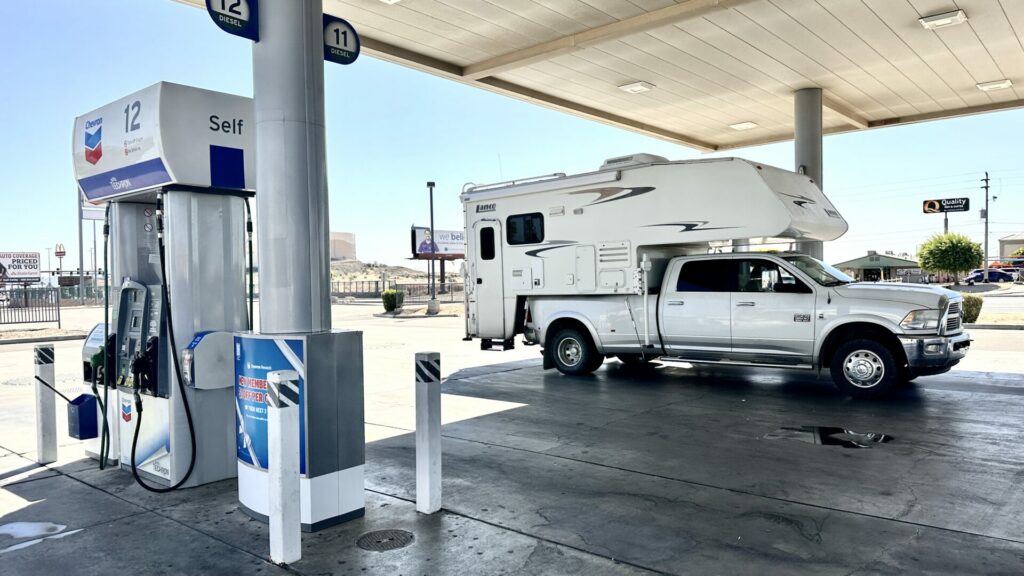
5. Moving Too Fast
Another mistake that many new full-timers make is moving too often. This will exhaust you faster than you realize. Many RVers feel like they have to do everything as fast as possible when they start out.
They want to see this place and do that hike. But you’re better off taking it slow. You’ll experience less wear and tear, which results in fewer repairs, and you’ll be able to enjoy each location to its fullest.
Packing up, driving, and setting up again every two weeks will lead to burnout. Consider staying at least three or four weeks in one location before moving when you first start traveling. This will also alleviate the stress of finding campsites so frequently.
Learn More: To avoid burnout, you should learn about The RVing 2/2/2 Rule.
6. Not Saving Money for Unexpected Repairs
We mentioned how important budgeting is to enjoy this lifestyle. You must save for repairs. A tire will blow, a skylight will leak, or a slide will malfunction.
RVs break all the time, especially for full-timers, because of the amount of use and additional wear and tear.
If you don’t save for unexpected repairs, you’ll be stuck figuring out what to do with your home when you can’t pay a mobile tech or RV service center.
If you have a leak and need professional help fixing it, this isn’t a repair you can put off until you can pay for it. Have an emergency fund so you’re prepared when these problems arise.
Pro Tip: Prevent issues with your RV. Here are Annual RV Maintenance Tasks Every RVer Can Do!
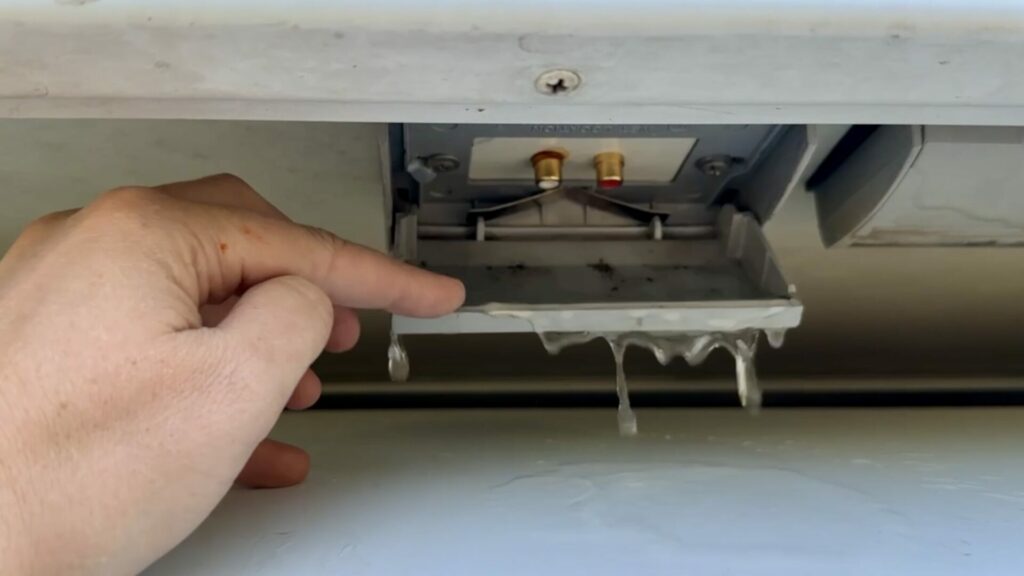
7. Setting Unrealistic Expectations
The last mistake new RVers make is setting unrealistic expectations.
You won’t have a campfire every night, the campsites won’t always be glamorous, you aren’t always surrounded by spectacular scenery, and you’ll spend more than you think.
Understand that Instagramers and YouTubers usually show the best of the best. They don’t show their kid having a temper tantrum on a hike, or the long line at the entrance station of a national park.
They don’t show the brutal wind storms that pass through the Southwest in early spring (well, we have). If you think your journey will be sunshine and roses every day, you’ll be disappointed from the outset.
While we try to show our issues and the downside of RVing on our YouTube channel, we know we are guilty of highlighting the good most of the time.
Be Prepared Before You Hit the Road Full-Time in Your RV
One of the biggest pieces of advice we can give new full-time RVers is to avoid jumping into this lifestyle. Do your research to set a realistic budget.
Reach out and talk to others who are embracing this lifestyle. We would also talk to people who left this lifestyle — what were their reasons?
The more prepared you are, the better your expectations. This lifestyle is amazing, life-changing even. But it’s not for everyone. Don’t make these mistakes when you start full-timing. If so, your adventure may not last as long as you planned.
Do you have other tips you’d like to share with new full-timer RVers?




